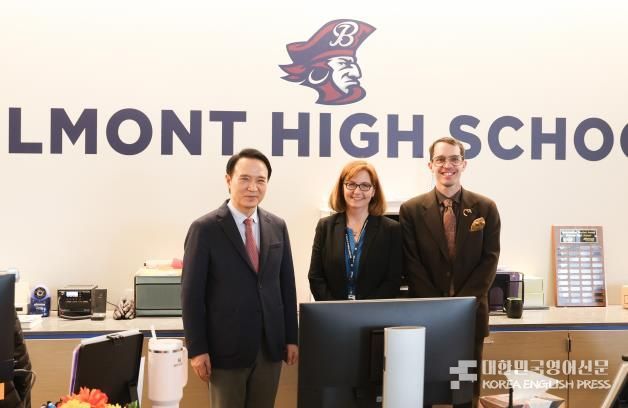
The visit was attended by Belmont Superintendent Jill Geiser, Harvard Graduate School of Education Professor Fernando Reimers, and Principal Isaac Taylor.
Lim toured the school with about 10 Korean students from Belmont High School and observed an anatomy class where students dissected a blue crab to learn about the structure of crustaceans, a math class where students used five dots to complete a graph, and an English class where students debated whether students should be allowed to do assignments via ChatGPT.
The best feature of Belmont High School is that students can choose their own classes based on their interests and aptitudes, especially as they progress from 9th grade (the third grade of middle school in Korea) to 12th grade.
Roe Jin, a 12th grader at Belmont High School, signed up for classes in psychology and brain science, which she plans to major in college, along with her favorite art classes.
“Many colleges and universities in the U.S. look at a student's hard work and talent, not just their SAT scores,” says Roe Jin, who wrote about her passion for art and her 1200 hours of volunteer work in her college applications.
Ian, a 12th grader at the same school, talked about South Korea's high educational aspirations and the college entrance examination system, asking, “Isn't studying the only talent?”
“There are many questions that universities ask besides SAT scores to evaluate students, and you can choose the ones that are favorable to you,” he said. “In the college application I applied to this time, there was a question about achievement experiences, so I wrote about my experience of playing the violin since the second grade and reaching a high level,” he said.
During the meeting with Korean students, Gene, a 10th grader at Belmont High School, asked Superintendent Lim about the differences between Korean and American education.
“There is not much difference from kindergarten through elementary and middle school, but in Korea, students often switch to a more “right-answer” education when they enter high school to prepare for college entrance exams,” Lim said.
“The Gyeonggi Provincial Office of Education is preparing to reorganize the college entrance examination system by developing a non-written assessment system that evaluates thinking, creativity, and problem-solving skills so that each student can freely choose what they want to do in the future based on their interests and aptitudes.”
In response, Mr. Jin said, “I knew about the Korean college entrance examination system, and I'm looking forward to the changes that will be made in the future.” In Korean, he added, “Please change it!”
[News Source: Gyeonggi Provincial Office of Education]
